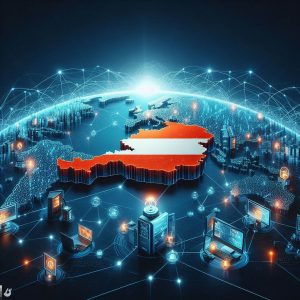I. Introduction to VPNs
A VPN, or Virtual Private Network, has become an essential tool for protecting your online privacy and security. As more people work remotely or use public Wi-Fi, and with cybercrime on the rise, utilizing a VPN is one of the best ways to keep your sensitive information safe when browsing the internet.
In short, a VPN allows you to create a secure, encrypted tunnel for all of your online traffic by routing it through an intermediate server run by the VPN provider. This prevents outsiders from being able to access and monitor your activity. And it allows you to change your device’s IP address which blocks tracking while also letting you access region-restricted content from anywhere.
There are a few main types of VPN protocols that offer different levels of speed and security:
- OpenVPN – Uses highly secure 256-bit encryption. Provides a good balance of security and fast speeds.
- IKEv2/IPSec – Very secure with fast connection times. Recommended for mobile devices due to lower battery usage.
- WireGuard – Emerging protocol focused on high performance and simplicity. Considered the future standard of VPN technology.
- PPTP and L2TP/IPSec – Legacy protocols that are now considered obsolete due to security vulnerabilities. Not recommended.
The most secure consumer VPNs now use either OpenVPN or IKEv2/IPSec. WireGuard is still relatively new but offers great promise for the future landscape of VPNs.
Now let’s examine the internet freedom and privacy considerations facing users specifically in Austria. We’ll look at popular use cases for VPNs there along with how to setup and start using VPN services in Austria.
II. Overview of VPN Usage in Austria
For the past several years, Austria has ranked near the top among European nations in terms of internet freedom. There is very little government censorship or restriction on access to online content or services there. However, many internet users in Austria still opt to use a VPN for a few important reasons:
Bypassing Geoblocks – Just like anywhere else, streaming platforms like Netflix and BBC iPlayer restrict content based on geographic regions. A VPN for Austria helps bypass these restrictions.
Public Wi-Fi Security – Free public hotspots are widely available but inherently insecure in Austria. A VPN adds a layer of encryption protecting private data.
Privacy Protection – Austria’s privacy laws are decent but VPNs provide added security against external monitoring by cyber criminals or even ISPs selling user data.
Now let’s look specifically at an emerging VPN technology called Outline VPN that was created with ease-of-use and privacy protection in mind.

III. Understanding Outline VPN
Outline VPN was developed by Jigsaw, an incubator that’s part of Google’s parent company Alphabet. The team behind Outline took the typically complex world of VPN services and created an easy-to-use solution focused on security, speed, and accessibility.
Specifically, some main features and advantages of Outline VPN include:
Easy Setup – Outline uses “Shadowsocks” technology that removes much of the manual server configuration required by other VPNs. You can deploy your own Outline server in minutes.
High Performance – Outline is engineered for speed. It uses state-of-the-art protocols like WireGuard to minimize latency. Streaming and downloads are lightning-fast.
Encrypts Everything – Unlike typical VPN tunnels that only route browser traffic, Outline encrypts absolutely all device traffic by creating an always-on VPN.
Open Source – Outline’s code is entirely open source meaning maximum transparency and trust for users. There are no questions about privacy practices or logging policies.
Outline creates high-speed, always-on encrypted tunnels designed specifically for security and privacy seekers. Next, we’ll walk through exactly how to setup and start using Outline VPN followed by best practices when using VPNs legally and ethically in Austria.
IV. Setting Up and Using VPNs in Austria
The great news about Outline VPN is how simple it is to setup compared to traditional VPNs that require installing apps. With Outline, you configure and deploy your own private VPN server in the cloud and then connect devices to that server.
Here are step-by-step instructions to get started:
- Sign Up for an Outline Server
Visit Outline’s website and click “Get Started”. Specify Austria as your country to deploy an Austrian server. Next choose a cloud provider like DigitalOcean or AWS to host your server.
- Launch Your Outline Server
After entering payment details, Outline instantly launches and configures your private VPN server. The entire process takes only 60 seconds.
- Install Outline Client
Download the Outline Manager apps for Windows, MacOS, iOS, and Android to connect your devices. Linux users can connect using the command-line interface.
- Connect to Your Outline Server
Open the Outline app and paste in your server credentials or QR code to establish an encrypted tunnel. That’s it! You are now securely browsing with your own dedicated VPN.
The Outline Manager app makes connecting from any device incredibly easy. Simply open the app, select your Outline server, and click connect.
For those using public Wi-Fi, Outline provides an always-on VPN that continues protecting your data even if you forget to manually connect. And Windows/macOS users can optionally enable Split Tunneling which allows excluding specific apps and traffic from the VPN tunnel.
Outline VPN removes the technical hassle from deploying and managing VPN servers while providing state-of-the-art encryption powered by WireGuard technology. Next we’ll examine the legal landscape around using VPN technology in Austria.
V. Legal and Privacy Considerations
There has been significant debate around the legal status of VPN services in Austria and across the EU. Uncertainty stems primarily from revamped EU regulations regarding data retention requirements and government access to private communications. However, using consumer VPN services remains entirely legal across Austria and greater Europe.
Here is a brief overview of the key legal considerations around using VPN services in Austria:
- No laws outright banning VPN usage – Austria has no specific legislation completely prohibiting the use of VPNs or proxy services by citizens. VPNs remain legal to use in Austria.
- Data retention laws may threaten privacy – Like all EU states, Austria has mandatory data retention requirements that can undermine VPN privacy promises unless proper jurisdictional safeguards are in place.
- Legal liability tied to usage, not VPNs themselves – Potential civil or criminal liability lies with individual users of VPNs, not VPN services directly. Using VPNs to engage in illegal acts carries risk.
Austrian authorities maintain that VPN usage itself does not constitute a crime. There are no restrictions against Austrian residents and tourists utilizing VPN services while present in the country or when abroad.
However, online activity conducted while connected to a VPN may still incur legal liability depending on the situation:
- Copyright infringement – Downloading/streaming pirated media using a VPN still violates Austrian copyright law.
- Cybercrime – Using a VPN to carry out illegal cyber attacks or hacking may constitute a criminal offense under Austrian law regardless of perpetrator location or nationality.
- Toxic speech – Austrian laws prohibiting hate speech, harassment, Holocaust denial, and similar apply online and are enforceable regardless of IP address or VPN usage.
In summary, Austrian residents and visitors are completely within their legal rights to make use of consumer VPN services if abiding by other Austrian laws pertaining to online speech and cybercrime activity.
Next we’ll outline some best practices for choosing a VPN provider that protects user privacy in accordance with Austrian regulations.
Choosing a VPN Service in Austria
When selecting a VPN for use specifically within Austria, consider the following factors:
- Jurisdiction – Avoid VPNs operated under 14-Eyes countries like the UK or US to reduce mandatory data retention requirements.
- Logging Policies – Only use VPN providers with guaranteed strict no-logs policies for Austrian servers/traffic to minimize data exposure.
- Payment Anonymity – Purchase VPN plans anonymously using gift cards or cryptocurrency where possible rather than traceable payment information.
Austrian laws allow individuals a reasonable expectation of privacy for personal communications like VPN traffic. However, mandatory EU data retention requirements undermine these privacy assurances if a VPN fails to implement proper jurisdictional safeguards and encryption protocols.
Using an offshore VPN provider headquartered outside surveillance-friendly countries allows Austrian users to maintain anonymity by not recording or retaining any traffic or usage data at all. Connecting using public Wi-Fi instead of home internet, purchasing services anonymously with crypto/gift cards, and employing trusted VPN protocols like OpenVPN or WireGuard make intercepting encrypted VPN tunnels virtually impossible.
In summary, Austrians can confidently use properly configured VPN services without running afoul of local privacy laws so long as reasonable steps are taken to prevent data retention overreach and ensure anonymous usage.

VI. Conclusion
As Austrians continue embracing mobile devices and public Wi-Fi networks, VPN usage will only grow in relevance for protecting personal privacy and maintaining a free and open internet. Outline VPN provides a streamlined option that removes typical technical hurdles of running VPN servers while offering technologies like WireGuard that optimize both security and speeds.
And using properly anonymized VPN services remains perfectly legal across Austria. By combining progressive protocols like WireGuard and Outline’s unique approach to ease-of-use, VPN adoption has the opportunity to expand significantly among mainstream consumers and business users alike instead of just tech enthusiasts.
The private tunnels created by VPNs serve as the foundation for an internet built on free speech, user privacy, and providing open access to information for all global citizens regardless of artificial restrictions or censorship. As emerging solutions lower technical barriers typically associated with VPN usage, many more Austrians stand to benefit from utilizing this important technology.